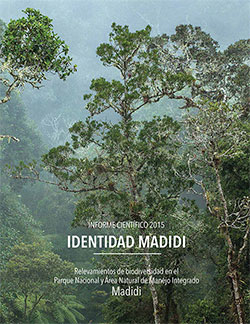Opinion study on
Opinion study on Madidi Identity
Opinion study on Identidad Madidi In order to know the perception of the urban population of La Paz and El Alto on the importance of protected areas for conservation and quality of life, and subsequently guide communication actions and their social impact during the Identidad Madidi scientific expedition, a baseline study was conducted in 2015 (before the Identidad Madidi expedition) and an impact assessment study in 2018 (after the Identidad Madidi expedition).
The methodology used was quantitative, based on a household survey of 640 cases (2015) and 644 cases (2018), in the cities of La Paz and El Alto. The composition of the population ranged from 14 to 70 years old, from different socioeconomic levels.
EXPERIENCES AND PERCEPTIONS OF PROTECTED AREAS
Contribution of protected areas to biodiversity conservation and its benefits for human development
A comparative analysis between the two studies shows that between 2015 and 2018 there was a positive impact on the social perception of the contribution of protected areas to biodiversity conservation: 85.4 % (2015) to 87.7 % (2018), considering the indicators of protection of plant and animal species: 82.1 % (2015) to 84.7 % (2018). Similarly, the presence of protected areas is perceived to bring benefits (water, clean air, food and medicine and better living conditions) to the populations of La Paz and El Alto: 70.7 % (2015) to 74.5 % (2018).
Knowledge and perception about protected areas
There is a better understanding of what a protected area means (48.6 %) in 2018 than in 2015 (34.9 %), although recognition of particular protected areas in the country is still low (20.5 %), similar to 2015. The best-known areas are Isiboro Sécure, Madidi and Cotapata. Only a small percentage, 3.7 % of respondents (approximately 50,000 people from both cities) ever visited a protected area, almost similar to the 2015 percentage (3.6 %). The probability of visiting an area in the near future, is equally low (11.5 %), although somewhat higher than in 2015 (10.2 %).
Knowledge and perception of Madidi National Park
Perception about the importance of Madidi for biodiversity conservation was significantly better in 2018 (65.3%) than in 2015 (51.8%). In terms of Madidi's values, the most weighted attribute in 2018 was its cultural and socioeconomic significance. In 2015, its biological value was more important.
Mass media were a source of information transmission: television (20.4%), radio (19%) and written press (19%). Dissemination through the ID Madidi website and Facebook was relevant: 17% and 10.4%, respectively.
Photographic exhibitions on Madidi's biodiversity and Bolivia's protected areas were important (24.9%), including the exhibition in Mi Teleférico (15.1%). Scientific dissemination talks in schools and universities were also mentioned (15.1%).
ATTITUDES TOWARD THE ENVIRONMENT
The indicators of attitudes towards the environment that measure the predisposition that the people of La Paz and El Alto have towards activities likely to generate environmental impacts in protected areas show a majority opposition to illegal logging and trafficking of animals in 2018 (53.1 %), with several points above the 2015 study (48.3 %). Similarly, there was a percentage increase in opposition to mining in protected areas in 2018 (54.4 %) compared to 2015 (47.5 %).
VALUES, BEHAVIOR AND COMMITMENT
Value indicators are relevant as they constitute principles that influence people's behavior. They are behavioral patterns influenced by people's experience with their natural, social and cultural environment. For the study, values were considered from an ethical, ecological, aesthetic, economic, scientific and legal dimension. The results show highly positive averages, both in 2015 and 2018, of the values expressed about the importance of environmental conservation for the development of life and human well-being. In 2018, the indicators rose to 85.9 % compared to 78.2 % in 2015.
In 2015, 85.6 %, and in 2018, 94.3 %, agreed in the idea that nature is our heritage and that it is also our obligation to preserve it for future generations. Similarly, 81.2 % (2015) and 92.5 % (2018) believe that environmental conservation is vital to ensure the life of different species, including humans. Finally, 78.1% in 2015, and 87.3% in 2018 believe that scientific research provides fundamental information to understand life, conserve natural resources and use biodiversity in a sustainable manner.
| Title | |||
|---|---|---|---|
|
Scientific Report 2015 1 548 downloads |
Reports | March 30th, 2021 | Download |
|
Scientific Report 2017 1 375 downloads |
Reports | September 1st, 2021 | Download |
|
Scientific Report 2016 1 333 downloads |
Reports | September 1st, 2021 | Download |




 Facebook
Facebook Instagram
Instagram YouTube
YouTube